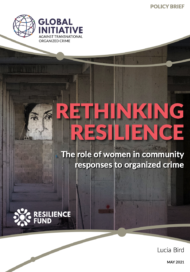Event Details
Posted on 20 May 2021
The role of women in resilience responses to organized crime is generally unexplored, and this paper is intended as the beginning of a narrative that seeks to deepen understanding of this dynamic.
This brief explores the roles women play in community resilience to organized crime, the socio-economic factors shaping these roles and the challenges associated with them, highlighting typologies of how women act as change-makers in driving resistance to organized crime and criminal governance.
Better understanding these dynamics helps inform successful interventions without merely placing additional burdens on women in contexts where the state has failed to provide protection and basic services. While recognizing gender as non-binary, and that the lived experiences of members of the LGBTQI community will shape how they are affected by organized crime, this paper focuses on women because they have been particularly highlighted through the work of the GI-TOC’s Resilience Fund to date.
Key points:
- Lacking a voice within traditional power structures –including state institutions and criminal culture –women are driven to act outside the ‘system’, shaping their role as community resilience actors.
- Women change-makers often act by interrupting entrenched cycles of violence, and reclaiming physical spaces from criminal governance in their resilience responses to organized crime.
- When supporting change-makers, it is key to enshrine their agency, mitigating the risk of instrumentalizing women and reinforcing existing gender inequalities.
- Empowering women’s community-resilience organizations to negotiate and partner with government and local authorities is crucial to sustainable initiatives.
- Donors and international partners should resource and support peer-to-peer networks among resilience actors to empower their collective voice.




